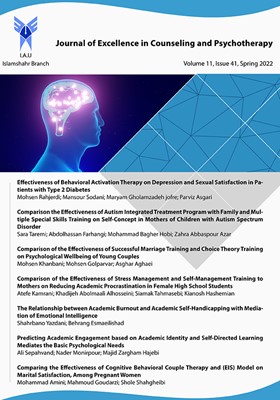Comparison of the Effectiveness of Successful Marriage Training and Choice Theory Training on Psychological Wellbeing of Young Couples
Subject Areas : Journal of Excellence in Counseling and PsychotherapyMohsen Khanbani 1 , Mohsen Golparvar 2 * , Asghar Aghaei 3
1 - PhD student, Department of Psychology, Faculty of Psychology and Educational Sciences, Islamic Azad University, Isfahan Branch (Khorasgan), Isfahan, Iran.
2 - Department of Psychology, Faculty of Psychology and Educational Sciences, Islamic Azad University, Isfahan Branch (Khorasgan), Isfahan, Iran.
3 - Department of Psychology, Faculty of Psychology and Educational Sciences, Islamic Azad University, Isfahan Branch (Khorasgan), Isfahan, Iran
Keywords: psychological wellbeing, young couples, choice theory training, Successful Marriage Training,
Abstract :
Purpose: Marriage and well-being are two intertwined phenomena at different stages of life. Successful marriage training and choice theory training in making the right decisions it seems are vital elements in providing psychological well-being for young couples. This research was administered with the aim of comparison of the effectiveness of successful marriage training and choice theory training on psychological wellbeing of young couples.Methodology: The research method is semi-experimental with three groups in three stages: pre-test, post-test and follow-up. The statistical population of the study included newly married couples (between one to six months after marriage) who referred to counseling centers in Isfahan in the summer of 2019. From the statistical population, 45 couples were selected through purposive sampling and randomly assigned to two experimental groups (15 couples in each group) and control group (15 couples). The short form of Ryff (1980) psychological wellbeing Questionnaire was used to measure the dependent variable. Successful marriage training group according to the needs of couples to know each other and choice theory training group according to Glasser (2000) choice theory trained each for 5 sessions of 90 minutes and one session per week and the control group did not receive any training. Data were analyzed by chi square, repeated measures analysis of variance and Bonferroni post hoc test by SPSS software, version 25.Findings: The results showed that successful marriage training is effective on the psychological well-being of young couples (P<0.01). Also, based on the results, choice theory training did not have a significant effect on the psychological well-being of young couples (P <0.05). Comparison of the two approach showed that successful marriage training was more effective on psychological well-being than choice theory training.Conclusion: Successful marriage education for Upgrade the psychological well-being of young couples is one of the possible approach trainings that can be considered for young couples.
_||_

